The High Stakes of Gambling Disorder: Recognizing the Signs

Gambling disorders can silently devastate lives, often going unnoticed until it's too late.
Linda Graves, with 27 years experience in the responsible gaming and gambling disorder space, has been at the forefront of addressing this issue.
Having worked with nonprofit state councils on problem gambling, administered public funds for gambling disorder services, and directed a national nonprofit agency, her extensive experience is unparalleled.
Here's what you'll discover:
- What is Gambling?
- What is a Gambling Disorder?
- The Difference between Social or Recreational Gambling and Gambling Disorder
- Signs and Symptoms of a Gambling Disorder
- Examples of Gambling Problem Signs & Behaviors
- Risk Factors of Gambling
- What Happens Physiologically When a Person Gambles (and Likes It!)
- Treatment Options for Gambling Addiction
- About Gambler’s Anonymous (GA)
Ready to delve deeper?
Continue reading to uncover the realities of gambling disorders and the solutions that can make a difference.
Author’s note
The best training a person can have in learning about gambling disorders is to take helpline calls from those in distress where one learns of the negative consequences and devastation that can occur from not gambling responsibly.
Gambling disorders can have a devastating impact on a person with the disorder, the person’s family, and the disordered gambler’s community. I will discuss signs and symptoms of a gambling disorder, diagnosis, risk and protective factors that may contribute to developing, or not developing, a gambling disorder. We will discuss some brain physiology that may affect those with gambling disorder and offer some resources for help.
What is Gambling?
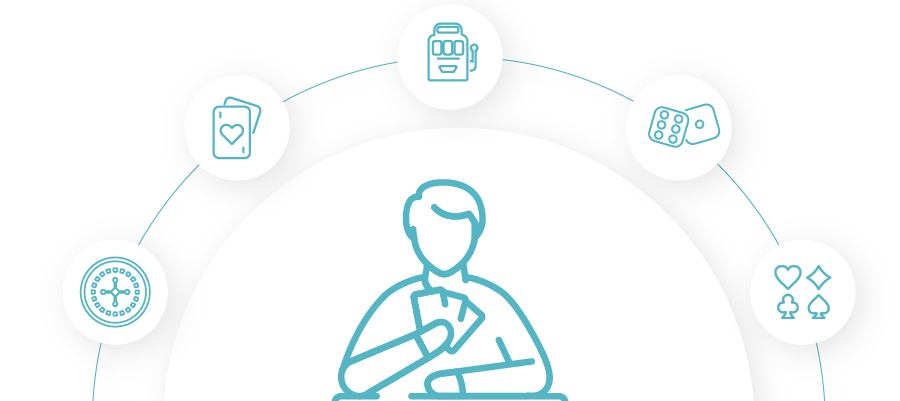
I. Nelson Rose, international expert on Gambling and the Law, defines gambling as an activity when a person pays something of value (consideration) to participate in an event that presents the possibility of winning something of value (prize) whose outcome is determined at least in part by chance.
In order to be considered gambling, the activity must have risk, prize, and unknown outcome. This differs from “entertainment” because we don’t really think of entertainment as having an “unknown outcome.”
If we spend money to see a movie or have dinner at a restaurant, we exchange goods and services for the cost of the movie or dinner.
Whether the movie or dinner was good or not, we still received goods and services for our money. When gambling, we are exchanging money for entertainment with an unknown outcome.
This is true whether we are buying raffle or lottery tickets, placing bets on sports or horse racing, or playing slot machines or games to win money on our phones.
Something is risked (paid) to win a prize (usually money) but the outcome is unknown and determined by chance.
What is a Gambling Disorder?

Gambling disorder refers to an uncontrollable urge to gamble, despite serious negative consequences. The Diagnostic and Statistical Manual of Mental Disorders, Fifth Edition (DSM-5).
In 1980, the term “pathological gambling” was included in the Diagnostic and Statistical Manual of Mental Disorders, (DSM-III).
It was located with impulse control disorders, not otherwise specified, along with trichotillomania (pulling out one’s hair) and pyromania (setting fires).
However, since that time, a large amount of research has been completed that illustrated that gambling disorder was not an impulse control disorder but was more like substance use disorders in the way it works in the pleasure centers of the brain.
In 2013, when the DSM-5 was published, gambling disorder was classified with substance use disorders.
The Gambling Disorder Criteria
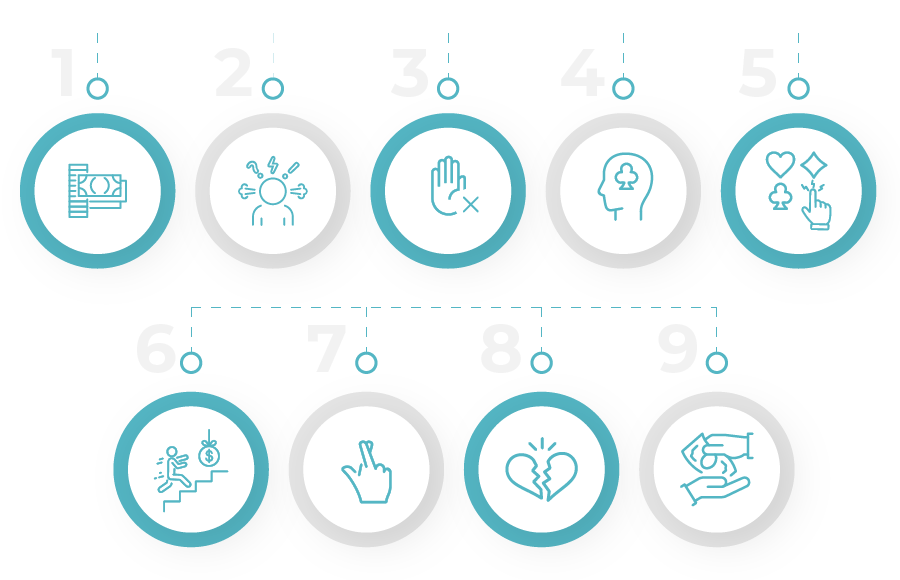
A person must exhibit at least four of the nine criteria in a 12-month period to be classified as having gambling disorder.
Here are the criteria, or characteristics, that are included:
- Needs to gamble with increasing amounts of money in order to achieve the desired excitement.
- Is restless or irritable when attempting to cut down or stop gambling.
- Has made repeated unsuccessful efforts to control, cut back, or stop gambling.
- Is often preoccupied with gambling.
- Often gambles when feeling distressed.
- After losing money gambling, often returns another day to get even (chasing losses).
- Lies to conceal the extent of involvement with gambling.
- Had jeopardized or lost a significant relationship, job, or educational or career opportunity because of gambling.
- Relies on others to provide money to relieve desperate financial situations caused by gambling.
Important
Even though we post these characteristics here, please note that only someone who is a trained counselor or therapist can diagnose a gambling disorder.
How Many People Actually Have a Gambling Disorder?
In two international research studies that determined how many adults have a gambling disorder, the findings were that just over 3% (Kim, et al. 2021, Stevens, et al, 2021) have gambling disorders worldwide. Though three of 100 people seems like only a few, the impact of that gambling can destroy lives.
If a family member uses funds needed for housing, fuel, food, clothing and other necessities for gambling, the impacts affect not only the gambler, but also the spouse and children in all areas of their lives.
It affects their physical wellbeing, mental health, financial and employment security, with many of the resulting consequences lasting a lifetime.
Disordered gambling impacts the community with widespread costs to social welfare systems, physical and mental health care, employment, social systems, benevolence, community participation and more. (Stevens, et al. 2023).
The Difference between Social or Recreational Gambling and Gambling Disorder
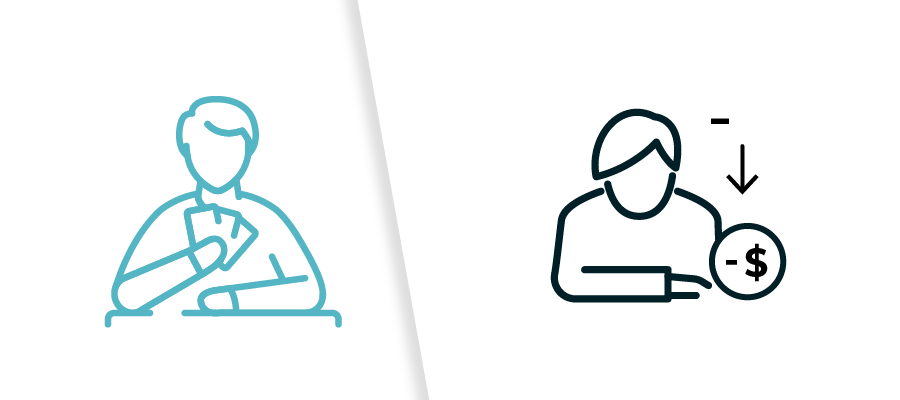
Most people (about 97%) can gamble without negative consequences, meaning they gamble responsibly, can set limits with both time and money and stay within those limits.
They gamble with entertainment money, not money that is needed to pay the bills, provide for the needs of their family, or spend their savings.
They have budgeted money for recreation and entertainment, and that is the funds that are used to gamble.
When they gamble, they think of those funds as “spent,” not funds that are “lost.”
When we think of something as “lost,” then we want to “find” it again, and that leads to chasing behavior.
Keep in mind
When people are social gamblers, or gamble responsibly, they take entertainment money to spend, enjoy gambling, and quit when that money is gone or when it is time to go home or do something else.
Those with gambling disorders are unable to do that.
As noted by the characteristics above, they chase losses, borrow money to gamble, including charging on a credit card, and cannot quit even though they may have tried.
They may lose their job because of absenteeism, they may lose their house because of inability to pay their rent or mortgage, and they may lose their family because of the mistrust and financial situation that has been created at home, and the hardships the family is experiencing.
The good news is that gambling disorders can be successfully addressed in treatment. In some countries and in some states, there is treatment available at no charge to those who may need it.
Signs and Symptoms of a Gambling Disorder
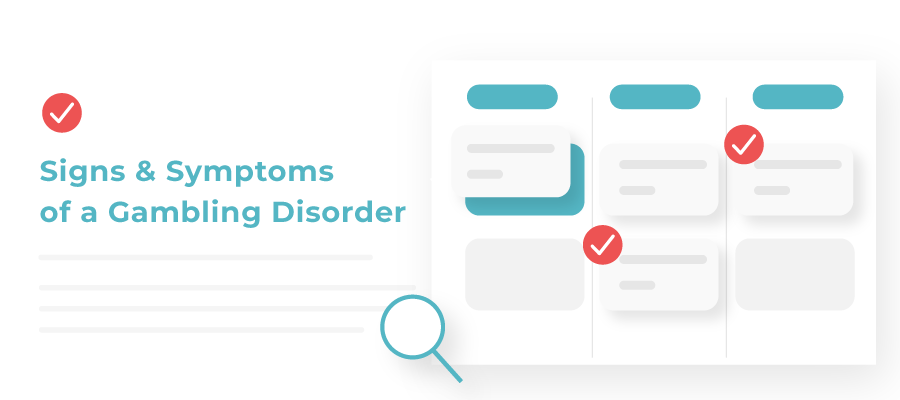
Most of us are not trained or qualified to diagnose a gambling disorder using the criteria listed above.
There are some behaviors that we may notice that might or might not indicate that someone is having difficulty because of their gambling.
Any one of these might not mean anything, but if a person has several of these behaviors, it might warrant a conversation:
- A person asks to borrow money frequently. The person will pay you back, at least at first, and then soon they will ask again.
- A person may have mood swings, sometimes being high, maybe even manic, and then they will act depressed, morose, really down. This might happen relatively rapidly, within a day sometimes.
- A person doesn’t show up when he or she says they will be there. And it happens more and more. He or she says they will be there, and they are not.
- A person is not participating in the same social activities, sports activities, church activities, etc that they usually do. You are missing them at social events. They are “missing in action.”
- Someone is lying to you about where they are, what they are doing, who they are with, etc.
- Spouses often wonder if their partner is having an affair with another person. They are lying, absent, not sharing their day or work experiences, seem to be hiding something, etc.
- Money seems to disappear. When there used to be enough, now it seems short. The person who is gambling really tightens up on the “purse strings,” making an issue of every item that needs to be purchased.
- The person quits sharing, talking. A person with a gambling problem often ends up lying to those he or she cares about because they don’t want others to know the truth of what’s going on. If they quit interacting, that lessens the need to lie to others.
- A person becomes emotionally volatile. The situation that has occurred because of their gambling makes them angry, ashamed, nervous, and irritable, and those conditions are reflected in the way he or she interacts with family and others around them.
- Things of value are missing in their house, television, sofa, artwork, etc. They might even sell the car, and get a cheaper, older one, or they may have lost it for not making the payments.
Be aware
These are just a few of the signs that could be noticed. Again, any of these does not mean a person has a gambling disorder.
There are myriad explanations for any of these, but if you have noticed several of these, then maybe a conversation would be a good idea.
Remember
Gambling disorder has the highest rate of suicide of any addiction. Chris Hedges, in America: The Farewell Tour, writes that 20 percent of gambling addicts attempt suicide. Initiating a conversation may save a life.
A word of advice, though: NEVER tell someone they have a gambling disorder. Instead, let them know that you are concerned about them and why, and say something like “It looks like you aren’t having fun anymore” or “If you think that you may have problems because of your gambling, here is a place that can help.”
That leaves the decision up to the person. You are not telling them what you think or what they should do.
Be ready with resources that are available to them in the area where they live.
Examples of Gambling Problem Signs & Behaviors
These are some examples of signs or behaviors that MIGHT indicate a person is having problems because of gambling behaviors:
- Preoccupation with gambling
- Needing to gamble with increasing amounts
- Restlessness or irritability when trying to stop
- Repeated unsuccessful efforts to control or stop gambling
- Gambling to escape distressing feelings
- "Chasing" losses
- Lying to conceal gambling activities
- Risking significant relationships or opportunities due to gambling
- Seeking financial help due to gambling losses
Risk Factors of Gambling
There are many risk factors that can affect a person’s desire to gamble.
There are environmental risks and hereditary risks. But there are also protective factors that influence the choices that a person may make.
Let’s look at the risk factors first.
Environmental Risk Factors
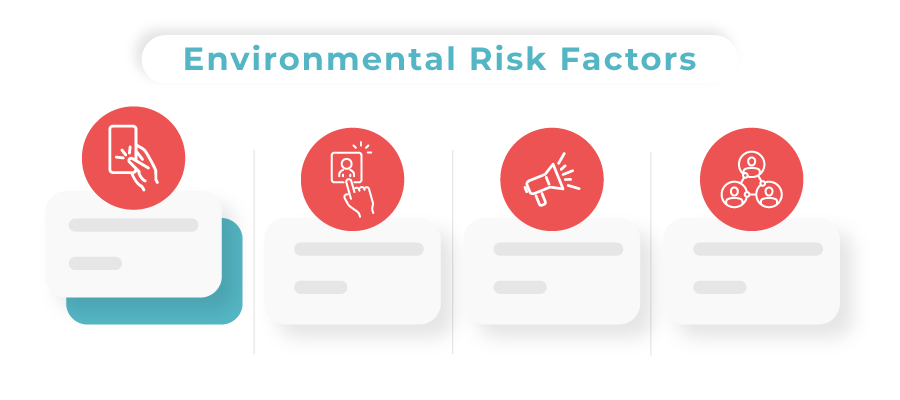
- Accessibility: With on-line gambling, every person who has internet capability is at risk of developing a gambling problem. It is at our fingertips. Those who are accustomed to using the internet and social media are more at risk of developing a gambling problem with internet gambling than older adults. If one’s social group is involved in gambling activity, one is more at risk of developing a gambling problem because we tend to engage in the activities that our friends are experiencing.
- Career choices: If we have a career that involves high risk, like law enforcement or firefighting, we are accustomed to the adrenaline surges that accompany the need to act quickly in dangerous situations and are drawn to recreational activities that produce those surges, which include gambling activities.
- Advertising: If gambling advertising is widespread in the community in which we live and the advertising is widespread in sources of media in which we use, we are more at risk of developing a gambling problem.
- Peers: We are influenced by those with whom we spend time. If our social group participates in gambling activities, and accepts gambling as socially acceptable, then we are more apt to ascribe to that thought also and participate with them or individually. If conversations circle around gambling activities, we have a desire to participate and contribute to that conversation.
Hereditary Risk Factors
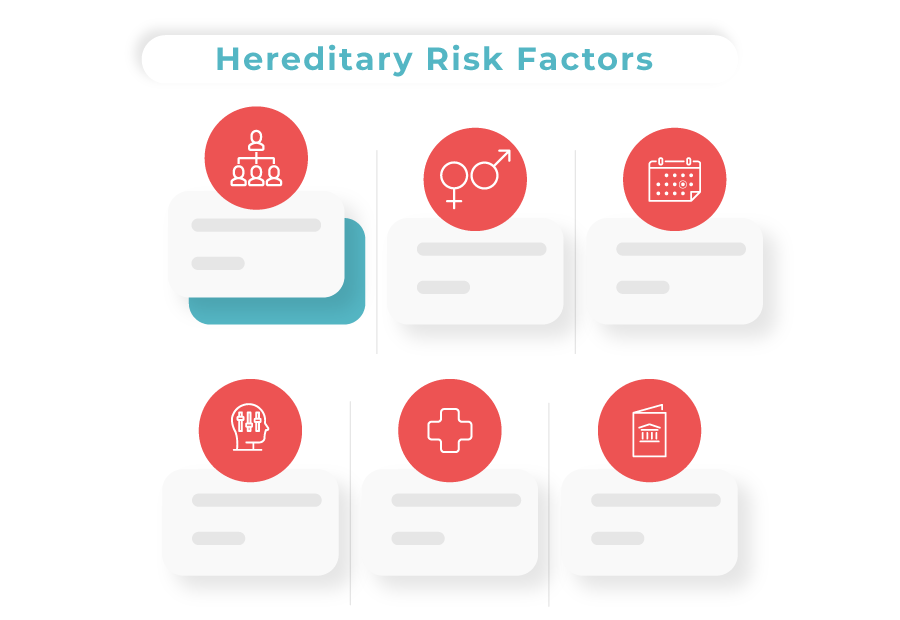
- Relatives: If we have parents or grandparents that have addictions of any type, we are more at risk of being influenced to develop an addiction ourselves, including a gambling addiction.
- Gender can contribute to risk: Males are more at risk than females to develop gambling problems related to “action” types of betting that take some skill and knowledge. Females are more at risk of developing problems from playing “escape” games that are more luck-based. However, these are not “absolutes,” with addictions forming because of the type of gambling in proximity.
- Age: The frontal cortex of the brain is not fully developed until around the age of 25. Though gambling is legal at the age of 18 in many locales, one can see that perhaps decisions are being made by those who are not yet mature, which puts young people, and young men, particularly, at risk of making poor decisions about their gambling behaviors. Underage youth (12-17 years old) have a higher prevalence of gambling disorders than adults. Some may mature out of the disorder, while others do not. Senior adults who have more time on their hands, may be limited in physical abilities, and lonely, can be more at risk of developing gambling problems.
- Personality traits: Each of us hashave a filter for how much risk we are comfortable taking. When we set up our retirement plan, the financial planner asked us, “How much risk do you like to take?” Some are risk-aversive, and others are not. This is just one personality trait that can contribute to whether we like to gamble. Whether we like action or escape, activity or rest, solitary or group activities, and many other dichotomies of personality all contribute to the risk that we are willing to take with gambling activities.
- Mental health: Those with mental health diagnoses may find “escape” from their life situation through the act of gambling, giving the person a sense of normalcy when they are depressed or anxious, and relieving their symptoms while they gamble. Those with ADHD may seek out activities with fast action and high energy and find that gambling satisfies those criteria. Those with mental health challenges find escape in the repetition of gambling activities, so it can be calming. Gambling activities mask depression, loneliness and other emotions to make the time tolerable.
- Culture: If one is of a nationality where gambling is part of the culture, learned at an early age, then one is at more risk. (This can be both an environmental and hereditary risk factor.)
Protective Factors

There are protective factors that help youth and adults not gamble to excess also.
- If one’s parents did not gamble, nor approve or admire the gambling activity of others, that is a protective factor.
- If one’s friends do not gamble, or do not approve of gambling behavior, a person is less apt to gamble, especially to excess.
- If one does not have gambling opportunities convenient to where they live, or does not have access to the internet, that is a protective factor. A person is less apt to develop a gambling problem.
- Spiritual beliefs that may prohibit one from gambling activities are a protective factor.
- Education regarding the odds of winning on any particular game can be a protective factor. The fact that a person is more apt to get hit by lightning twice in the same day than win the Power Ball can be a deterrent in overspending on Power Ball tickets.
- Public health models that support education and services regarding gambling behavior, which includes limiting advertising, advertising help and support opportunities, no-cost services for those affected by gambling disorder, etc.
Keep in mind
This is not a comprehensive list of risk and protective factors. In the 21st century, there are many more risk factors than are listed here. The protective factors are more elusive and less prevalent. However, each person can decide their view about gambling, responsible gambling, the risks involved.
Each person will decide, hopefully before engaging in the activity, about their limits, make responsible decisions about time and money to be played, and act safely.
What Happens Physiologically When a Person Gambles (and Likes It!)
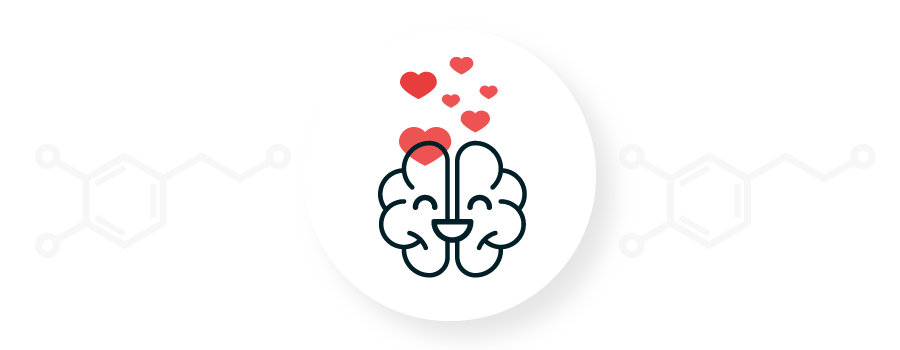
There are measurable changes in the brain when a person who likes to gamble gambles.
Dopamine is a neurotransmitter that causes feelings of pleasure, and our brains say, “I like it!”
We have certain levels of dopamine all the time, but there are activities that we do that stimulate its production.
These activities include exercise, eating, having sex, and gambling, to name a few. When a person gambles, dopamine is released, giving the person feelings of pleasure.
Behind the forehead is a section of the brain called the prefrontal cortex.
This is the portion of the brain that controls executive functioning, where we weigh the pros and cons of deciding, choose immediate gratification over waiting for a reward later, and memory. This area of the brain also helps the body respond to emotions.
When dopamine is released, it reduces activity in the prefrontal cortex thus making it more difficult to control impulses. The person may struggle more weighing the immediate rewards versus the consequences.
Dopamine increases excitement levels and reduces inhibitions.
When a person who likes to gamble is observed through functional magnetic resonance imaging (fMRI) and is shown a gambling video or given the opportunity to play a gambling game, there are areas of the brain that light up just like that of a cocaine user who has used cocaine.
Deep inside the brain, there is an area called the ventral striatum, which is the control center for rewards.
Scientists theorize that some people have a reward deficit system, where their brain has an underactive brain reward system.
The theory is that these people engage in stimulating activities like gambling or using drugs to get positive feelings, not for the money. Studies using fMRIs show that having a near win stimulates the brain in the same way that having a win does.
The increase of dopamine affects many parts of the brain, not just the prefrontal cortex and the ventral striatum.
Treatment Options for Gambling Addiction
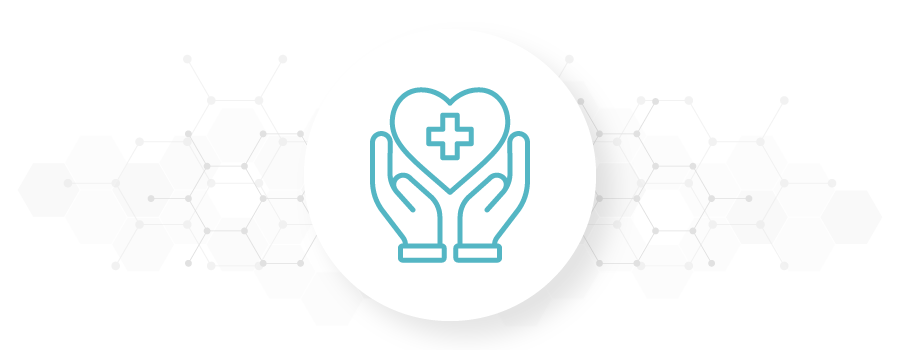
From my work in the field of gambling addiction, the best outcomes for treatment come from a combination of options used simultaneously.
Cognitive behavioral treatment is the standard and the most widely used methodology for treating gambling problems.
However, when it is used with Motivational Interviewing (MI) and when the person also participates in a Gamblers Anonymous (GA) Fellowship regularly along with the therapy, a person achieves the best outcomes.
When one comes to treatment, their initial treatment goal is one of the first points of discussion after crisis intervention for safety of the gambler, the spouse, and the children.
Not all people who are affected by a gambling disorder want to stop gambling. They do, however, want to stop the harm that is being caused by gambling. The client’s goal in treatment should be addressed first.
Through motivational interviewing techniques, the client’s goals in therapy can change toward reducing harm from gambling. At some point, the client may determine that abstinence is the best model.
Therapists who treat using Eye Movement Desensitization and Reprocessing EMDR have found success treating gambling disorder. EMDR is used for those clients who have had traumatic experiences or periods of heightened emotions, such as Post Traumatic Stress Disorder (PTSD) and Adverse Childhood Experiences (ACES).
There are models that use psychotherapy alone and with medication.
Models which use longer durations of therapy are often not effective quickly enough to be effective in the number of sessions covered by insurance plans or state-funded treatment programs, so these modalities are used with private-pay patients.
However, those with gambling disorders often do not have the means to pay privately.
In some locations, brief interventions are offered, consisting of a short number of sessions, perhaps 1 to 3 total. This type of treatment can be effective for those that need “a wake-up call” as it uses a reality check system to look at what is happening right now. This type of treatment can be used in emergency rooms in hospitals, for instance, with some success.
About Gambler’s Anonymous (GA)

Gambler’s Anonymous (GA), started in 1957, is an international fellowship of people who have compulsive gambling problems who meet regularly to share their experiences, strength, and hope. It is a 12-step meeting modeled after Alcoholics Anonymous (AA), with those in attendance having a commonality of gambling harm, and with all seeking improvement and ultimately abstinence from gambling.
The only requirement for attendance is a desire to stop gambling. As gambling options and accessibility has expanded, GA has expanded and can be found internationally.
A sister organization to GA is Gam-Anon, for individuals affected by another’s gambling.
Though not as extensively found, Gam-Anon works on a similar program, and often meets at the same time as a GA meeting in a particular location.
It is also 12-step based with only those who “qualify” in attendance.
Members of the fellowship discuss their own behaviors that may need to be changed to find their way back to a normal way of thinking, regardless of whether their loved ones continue to gamble.
Conclusion
Understanding gambling disorder is the first step towards addressing its profound impact on individuals and society.
This guide has shed light on its complexities, the signs to watch for, and the resources available for those affected.
Remember, acknowledging the problem is half the battle. With awareness, support, and timely intervention, recovery is not just a possibility - it's a promise.
Let's work together to promote responsible gambling and provide a safety net for those who find themselves ensnared by this challenging disorder.
Helpful Resources
Here are some useful resources that you should check out if you or a close one is struggling with gambling problems:
GamCare:
This site supports live chat, WhatsApp, Facebook Messenger, and offers tools and resources.
0808 8020 133
National Council on Problem Gambling:
United States National Helpline: 1-800-GAMBLER
The call will be routed to the state where the phone prefix originates for help available in that state.
National Association of Administrators for Disordered Gambling Services (NAADGS):
Directory of publicly funded problem gambling services by state in the US, with contact information for each particular state.
Gambler’s Anonymous:
www.gamblersanonymous.org (international)
Gam-Anon:
www.gam-anon.org (international)
References
- Kim HS, Son G, Roh EB, Ahn WY, Kim J, Shin SH, Chey J, Choi KH. Prevalence of gaming disorder: A meta-analysis. Addict Behav. 2022 Mar;126:107183. doi: 10.1016/j.addbeh.2021.107183. Epub 2021 Nov 19. PMID: 34864436.)
- Stevens MW, Dorstyn D, Delfabbro PH, King DL. Global prevalence of gaming disorder: A systematic review and meta-analysis. Aust N Z J Psychiatry. 2021 Jun;55(6):553-568. doi: 10.1177/0004867420962851. Epub 2020 Oct 7. Erratum in: Aust N Z J Psychiatry. 2023 Jun;57(6):928. PMID: 33028074.)
- American Psychiatric Association: Diagnostic and Statistical Manual of Mental Disorders. Fifth Edition. Washington, DC: American Psychiatric Association.2013.
- Hedges, C. (2018). America: The Farewell Tour. Simon &Schuster. Retrieved from https://www.perlego.com/book/1392201/america-the-farewell-tour-pdf (Original work published 2018)
- Campbell-Meiklejohn D, Wakeley J, Herbert V, Cook J, Scollo P, Ray MK, Selvaraj S, Passingham RE, Cowen P, Rogers RD. Serotonin and dopamine play complementary roles in gambling to recover losses. Neuropsychopharmacology. 2011;36:402–410. doi: 10.1038/npp.2010.170. [PMC free article] [PubMed] [CrossRef] [Google Scholar]
Explore More Safe Gambling Guides
Safe Gambling Q&As
Got questions about Safe Gambling?
Ask a Question




